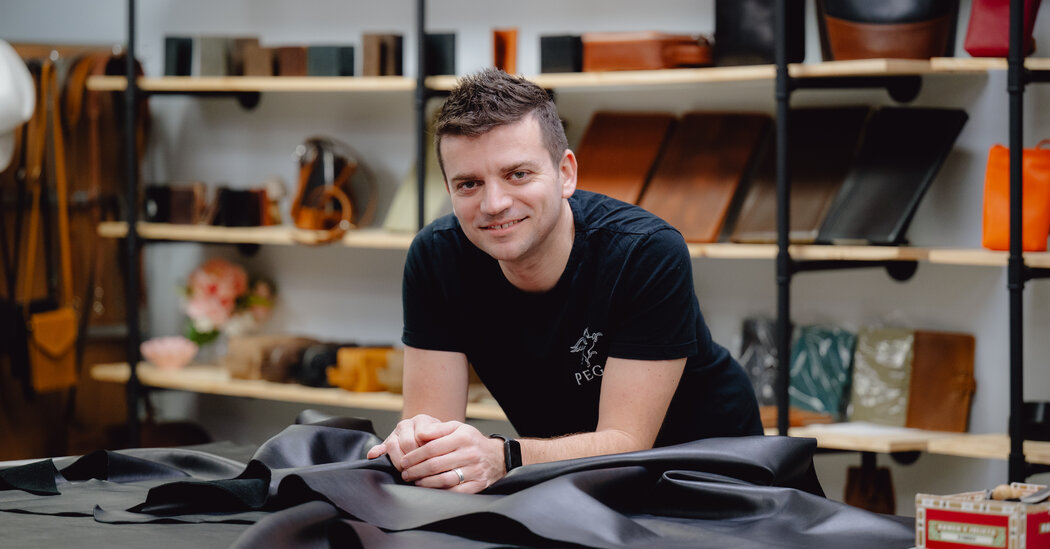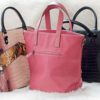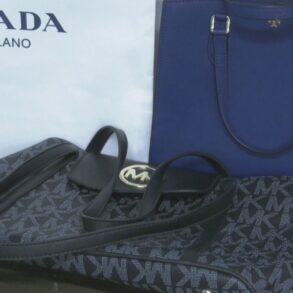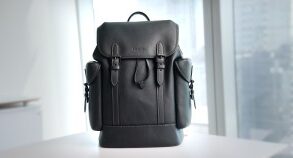
Under the handle Tanner Leatherstein, Volkan Yilmaz rips, burns and slices apart luxury goods to show how much he thinks they are really worth.
One video opens with a large white leather handbag covered in the signature LV logo of Louis Vuitton. Within milliseconds, a hand with a switchblade swoops in and slashes a huge gash in the side of the bag before tearing it apart at its seams. In another, the distinctive red sole of Christian Louboutin is loudly ripped from a black stiletto using a wrench; in still another, scissors snip through a $2,200 Prada clutch before a man sets fire to a piece of the leather and turns it to ash.
You’ve entered the TikTok world of Tanner Leatherstein, which has more than 950,000 followers. Leatherstein, whose real name is Volkan Yilmaz, has attracted a cult following on the social media platform — as well as on YouTube and Instagram — for his butchering of exorbitantly expensive items. The reason, he says, is to show his viewers the true quality of the materials and craftsmanship and then break down how much the item may have cost to make.
“In many cases,” Mr. Yilmaz said from his Dallas workshop in December, “my estimates come in at about a tenth of what the price tag says. The markups that underpin the luxury business still shock a lot of people.”
In the edited interview below, Mr. Yilmaz, 37, discussed his lifelong obsession with leather, how much he spends on luxury products for his platform and what people should look for when buying new leather items.
When did your love of leather goods begin?
My family owned a tannery in Turkey, so I was born into the business. Around 11, I tanned five sheepskins to make my first leather jacket. While at college in Istanbul, I worked at the tannery, then went to China to learn about leather imports and exports and then to Turkmenistan.
In 2009, I won the U.S. green card lottery and moved to Chicago. I drove a cab while I got an MBA from the University of Illinois, then worked as a management consultant, which made me feel like I was dying inside. I was still obsessed with leather, so I started my own leather brand called Pegai, teaching myself about the design side from YouTube and driving Uber jobs to make ends meet. In 2019, once the business was underway, I moved to Dallas.
Why did you start creating social media content?
Friends and even friends of friends have always asked me to check their leather purchases. What do I think of the quality? Have they paid too much?
It made me realize that people don’t actually know that much about how leather is sourced or used and are suspicious about the markups on luxury leather products. So I started making some videos to answer their questions. I didn’t expect them to blow up the way they have.
More than anything else, you are known for slicing up bags. Why do you do that?
When I started dissecting bags, I wanted to show that price really wasn’t about the leather or the materials used — that it was mostly about the status associated with a label. So many people automatically assume that if it’s expensive, it must be good.
What was the first bag you ever cut up?
It was a Louis Vuitton briefcase. Louis Vuitton is one of the most famous leather brands in the world, but many people don’t know that the iconic LV monogram material is actually canvas. The first video that went viral was a little $1,200 wallet from Chanel. From then on, requests to feature different brands have been rolling in nonstop.
@tanner.leatherstein Is the LV Neverfull worth it? This is Neverfull MM in Monogram Empreinte Leather. ✂️#louisvuitton #louisvuittonbag #lv #neverfull #lvneverfull #bagtok #pursetok #luxurytok #fashion #luxuryfashion #baglover #empreinteleather #leatherexpert #lvlover #handbags #tannerleatherstein #fashionreview #luxuryunboxing #luxurybag #leatherbag #✂️ ♬ original sound – Tanner Leatherstein
What are you looking for when you slash a bag?
The leather quality, of course. How it has been tanned. I use acetone to remove the finish, and I can see how much plastic makeup has been applied to the leather. I burn the leather to assess what tanning process has been used. Then I look at the craftsmanship, which is reflected in the stitching, hardware and construction.
A big part of what I do is assessing the brand’s claims. A bag might look good from the outside, but when you rip it open and look inside, it tells another story.
Who are the almost two million followers you have on social media?
There is definitely a demographic who hate luxury brands, full stop, who think the pricing is a scam and that people who pay for them are stupid. Then there are people who just love the entertainment value of chopping up expensive products. But many people are watching the videos because they love luxury and want a better understanding of quality products. They want to assess their luxury or vintage purchases with their eyes open.
Which brands are worth the money?
Bottega Veneta uses incredible leathers, and I’ve done three or four videos on their beautiful products. Though in one video — on a $650 wallet — I cut it up, and the lining was made from a lower quality leather than the one described on the label. (Bottega did not respond to a request for comment).
I really like a Scottish label called Strathberry. They make their products in Ubrique, which is this small town in Spain where brands like Loewe and Dior make their goods. But Strathberry is a fraction of the cost — more like $500 instead of $3,000. Polene is another great label made by people who really know what they are doing. Coach is pretty good at a mid-price point.
Are you ever shocked by what you find?
I don’t get positively shocked — I’m paying a lot of money. Great if we can show a bag to be great material and design, but that should be the standard.
Do brands reach out to you now?
Not really, and especially not from the luxury space. I don’t accept free items or advertising opportunities. People will trust me only if I stay totally independent.
Lots of people will have given or received leather goods during the holidays. Any tips for them?
Trust your senses. Feel it. If it feels plasticky, that’s not a good sign. Smell it. There isn’t only one leather smell, but there is a pleasant, slightly earthy aroma to quality leather. It should not smell like chemicals.
Look at it. Leather is an animal-sourced product. It has variations to its grain and fiber structure. The more variations you see in the fabric, the more natural and untreated it is. If it’s overdone with a heavy finish, leather becomes very standardized and lower quality hides can be hidden.
This post was originally published on this site be sure to check out more of their content.







